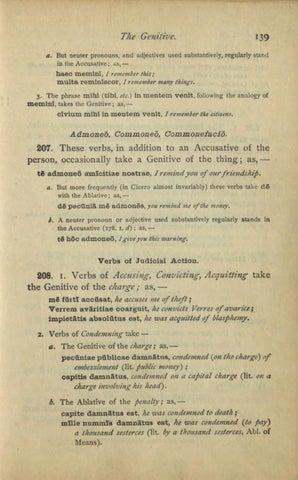The Genuiue.
139
a. But neuter pronouns, and adjectives used substantively, regularly stand in the Accusative; ~s,haec memini, 1 remember this " multa reminiscor, 1 remember many things. 3. The phrase mihi (tibi, etc.) in mentem memini, takes the Genitive; as,civium mihi in mentem
venit, following the analogy of
venit, 1 remember the citizens.
Admoneo, Common eo, Oommonetticio.
207. These verbs, in addition to an Accusative of the person, occasionally take a Genitive of the thing; as,-
te
admoneo a'nlicitiae nostrae, I remind you of our friendship. a. But more frequently (in Cicero almost invariably) these verbs take de with the Ablative; as,de pecunia
o.
me admones, you remind me of the money.
A neuter pronoun or adjective used substantively regularly stands in the Accusative (178. 1. d) ; as,-
te hoc admoneo, 1 give
you this warning.
Verbs of Judicial Action.
208. I. Verbs of Accusing, Convicting, the Genitive of the charge ; as,-
Acquitting:
take
me flirti acciisat, he accuses me of theft; Verrem avaritiae coarguit, he convicts Verres of avarice; impietAtis absoliitus est, lze was acquitted of blasphemy. 2. Verbs of Condemning
take -
a. The Genitive of the charge; as,peciiniae piiblicae damnatus, condemned (on the charge) of embezzleme1lt (lit. public money) ; capitis damnatus, condemned 01l a capital charge (lit. on a charge i11volvi1lg his head). b. The Ablative of the penalty;
as,-
capite damnAtus est, he was condemned to death; mflle nummis damnatus est, he was condemned (to jJay) a thousand sesterces (lit. by a thousand sesterces, Abl. of Means).
